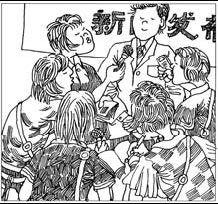In search of the missing newsmen
By Hong Liang (China Daily)Updated: 2007-07-24 06:57
It suddenly dawned on me when I came to work this morning that there are many more women reporters than men in our Shanghai newsroom. That, of course, isn't a problem for me. But I keep wondering if this profession, which was dominated by men not too long ago, has somehow lost its attraction to the male members of Chinese societies on the mainland and in Hong Kong.
 I have searched in vain for statistics on the Internet to support my notion.
Perhaps the issue is considered too trivial for the research companies. But as a
practicing journalist and, like millions of others, an avid reader of newspapers
and magazines, I am curious to find out if this widening gender gap points to
any hidden development in the profession which has been thrown into confusion by
the Internet.
I have searched in vain for statistics on the Internet to support my notion.
Perhaps the issue is considered too trivial for the research companies. But as a
practicing journalist and, like millions of others, an avid reader of newspapers
and magazines, I am curious to find out if this widening gender gap points to
any hidden development in the profession which has been thrown into confusion by
the Internet.
Let's examine the phenomenon. A couple of years ago, I was invited to give a talk to a journalism class at Shanghai International Studies University. There were about 30 students in the class. Only two of them were men.
Every summer, our Shanghai office takes in a dozen or so interns, at different times, from journalism schools at various universities in the city. This year, only one man came. He spent less than two weeks with us before losing interest and leaving.
Some time ago in Hong Kong, I had the opportunity to talk to a small group of journalism teachers on a wide range of topics. On the question of why was the journalistic profession losing its appeal to male students, members of the group produced a number of interesting hypotheses.
One pointed to the low pay and long working hours as the reasons that have turned so many men away from seeking a career in newspapers and magazines. But poor working conditions are nothing new to the profession.
Who among us have not fantasized every now and then about being a war correspondent, filing stories on wireless phone from the trenches? Certainly, hardship could not have been a factor that deters men from joining the journalistic brotherhood.
Another teacher in the group postulated that because the
bar of entry to journalism has been raised, most men with university degrees can
find higher paying jobs in other professions. But that goes for women too.
People with good educational background and strong communication skills are
always in demand in the job market. We still don't understand why there are so
many more women than men wanting to become reporters and writers. 
Exasperated, I posed the question to a newly recruited reporter in the Shanghai office. She gave up a high paying job in a multinational company to come to work for us. She should be in a better position than anyone else to help me solve the gender gap riddle. Her answer was short and straightforward. "I like writing, and I feel I get a lot more self satisfaction from my work as a reporter," she said. I believed her. But it still has not shed much light on the issue in hand because I am sure that the passion for writing is shared by as many men as women.
I remember a column I read sometime ago written by a woman editor lamenting that men still dominate the top echelons of many news organizations. This, too, might be changing. The chief editor of one of the most respected business journals on the mainland is a woman.
Maybe there is really nothing to the gender gap in journalism. All we hope is that our fellow men don't get the wrong impression about the future of the profession at a time when it is facing unprecedented challenges from the many freewheeling bloggers dispensing "pseudo" news on the Internet.
And we must pay tribute to the many young women, dedicated to their ideals, for keeping the beacon of journalism alight in the darkest hours of the profession.
E-mail: jamesleung@chinadaily.com.cn
(China Daily 07/24/2007 page10)
|
|
|
|